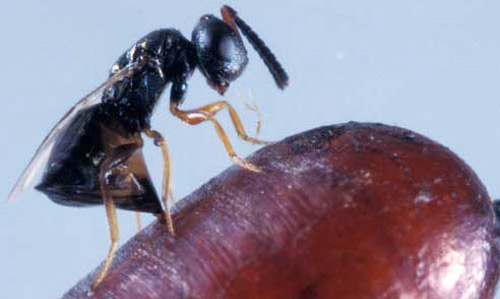
From two weeks to a month in the wild. Some longer periods of survival have been noted but.

The smaller flies are not young adult flies.
How long does a fly live without food. How long can a fly live without eating. It depends on what type of fly you are asking for but as for the type of fly most people usually mention the house fly Musca domestica it can live for 23 days without food. Like most living creatures a fly cant survive without food and a fly cant survive more than two or three days without it.
Access to sugar can further enhance a flys longevity. Another factor is temperature as adult flies live longer in cooler temperatures. The Lifecycle of a Fly.
Unfortunately the typical home or business provides the perfect living conditions for these insects. On average a fly can live two to three weeks. The rapid growth in a fly lifespan means there can be multiple generations living in your kitchen or buzzing around dumpsters.
Even if the adults die off the eggs remain. To be safe keep produce in a sealed container or. How long do house flies live.
An average house fly lives about a month. In that time females can lay five to six batches of eggs. Although theyre more active in the summer house flies reproduce year-round.
How long do fruit flies live. The lifespan of a fly can also depend on the species. For example fruit flies live a little longer than house flies.
These insects die after about 40 to 50 days. 18 Zeilen But when they have an unlimited supply of food they can only last for 30-35. How long can a fly live without eating.
Depending upon what you mean by fly they may go their entire short 25 day lives without eating. Flies of most varieties do the bulk of their dining during the larval stage. Commonly house fly can live for 15 to 60 days with a food availability and temperature as its growth factor.
But to mention total lifespan of house fly from larva to adult phase we can say that house fly survives 21 to 117 days. From two weeks to a month in the wild. In specialized conditions laboratories they can live for even longer.
That is the estimation of one source by the way. Other sources say that they dont live for more than half a day or two days or three days or such comparatively short numbers. After laying eggs maggots will hatch out and eat their way through the decaying organic material before pupating and then emerging as an adult fly a few days later.
The adult flies can live. The longest a housefly will last inside is about two weeks. And the adults can live for two weeks to a month in the wild.
They can live even longer if they are in benign laboratory conditions. Once they are out of the pupae they dont grow anymore. The smaller flies are not young adult flies.
According to one article those on their deathbeds can survive between 10 and 14 days without food and water. Some longer periods of survival have been noted but. The fact that a house fly can live a lot longer than 24 hours means you might have to deal with a fly infestation for an extended period of time.
Flies a can contaminate both food and food preparation surfaces. Trying to deal with a fly infestation on your own could lead. Every person and situation is different though the rule of threes gets at the desperate nature of what our bodies need.
3 minutes without oxygen three days without water three weeks without food. But some extraordinary members of our species have broken and redefined these and other limits of human survival. The time it takes for fruit flies to mature changes depending on environmental factors.
When temperatures are high the insects can complete their entire life cycle in 8 to 10 days. While these pests can cause issues for residents and business owners year-round the most common infestation period is during warm summer months. Thus a fruit fly has a higher chance of living longer than a regular housefly.
Fruit flies die after living between 40 to 50 days. They can also reproduce several generations during these days. A female fruit fly is capable of producing about 500 off springs.
While the average life span of a housefly is only one month outdoors during that time they can multiply and spread a lot of bacteria. If you are wondering why houseflies always tend to migrate towards food and fecal matter their bodies are covered with small hairs that work like taste organs. The housefly Musca domestica is a fly of the suborder CyclorrhaphaIt is believed to have evolved in the Cenozoic Era possibly in the Middle East and has spread all over the world as a commensal of humansIt is the most common fly species found in houses.
Adults are gray to black with four dark longitudinal lines on the thorax slightly hairy bodies and a single pair of membranous wings.